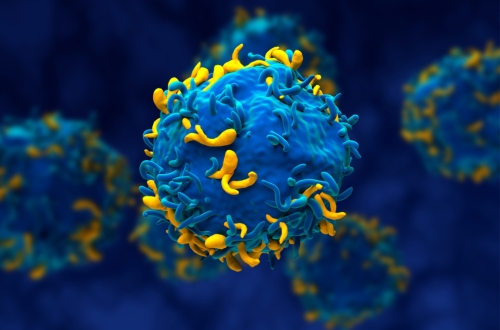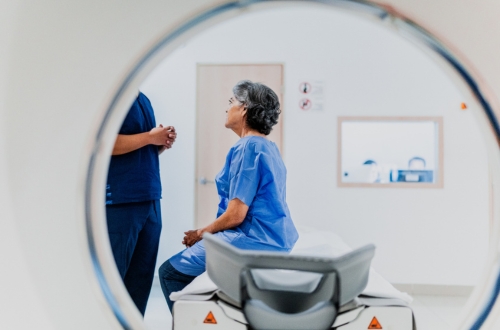What are the Top 5 Most Promising Breakthroughs in Clinical Trials Today?
Clinical trials are an essential step in the development of new treatments and therapies because they enable researchers to evaluate the safety and efficacy of new medical interventions, from drugs to therapeutic procedures to medical devices, before they are approved for market use. They represent a relentless pursuit of knowledge, the application of best practices, and an unwavering commitment to patient well-being. Recognizing the dedication of clinical research professionals worldwide that makes medical breakthroughs possible, the Association of Clinical Research Professionals (ACRP) established Clinical Trials Day in 2014.
This year, on May 20, join TFS HealthScience CRO (Contract Research Organization) as we celebrate the work of modern-day trailblazers in clinical research. This article honors their work by reflecting on the top five most promising breakthroughs in clinical trials today, as well as highlighting key leaders in various therapeutic areas. Read on to learn more!
Understanding Clinical Trials and their Importance in Clinical Research
What are Clinical Trials?
Clinical trials have been an integral part of medical research since the mid-20th century, playing a key role in improving healthcare outcomes. In these trials, human volunteers are recruited to receive either the investigational drug or intervention (if randomized into the treatment group) or a placebo or the standard of care (if randomized into the control group). Both groups are then evaluated for the efficacy of the intervention in an unbiased manner, with the results being used to drive market approvals.
Stages of Clinical Trial Testing
Clinical trials are executed in several phases, each with a distinct purpose and process.
- Phase I trials aim to evaluate whether the potential treatment is safe to administer to humans, understand potential side effects, and determine the safe dosage range.
- Phase II trials help further investigate the safety and effectiveness of the interventional treatment in a larger group, as well as identify the maximum tolerated dose in patients.
- Phase III trials confirm the safety and efficacy of the investigational product, demonstrating whether a drug has more significant benefits or fewer side effects than existing standard therapies on the market.
- Phase IV trials evaluate the long-term risks and benefits of an approved treatment and its efficacy across a larger population in real-world settings.
Why Clinical Trials are Critical in Medical Research
Clinical trials are key tools for practicing evidence-based medicine. They enable researchers and physicians to determine whether a new treatment, such as a drug or medical device, is safe and effective in humans. They also help to determine the most effective treatment for a particular disease or patient population and promote the development of novel therapies in an ethical and scientific manner.
1. Oncology Clinical Research: Novel CAR-T Cell Approach for Glioblastoma
Study Title: CARv3-TEAM-E T Cells in Glioblastoma
Clinical Trial Number: NCT05660369
Stage of Development: Phase 1
The development of a novel CAR-T cell approach, designed in the laboratories of Massachusetts General Hospital, shows significant promise in the fight against glioblastoma, one of the most deadly forms of brain cancer. Solid tumors like glioblastoma are especially challenging to treat, given their diverse cell population. In response to this, the researchers combined two previously separate strategies, CAR-T and bispecific antibodies (also known as T-cell engaging antibody molecules [TEAM]), to treat glioblastoma in a broader, potentially more effective way. The first patients to receive this novel treatment experienced dramatic reductions in their tumors just days after a single treatment, with one individual even achieving near-complete tumor regression. Following these promising results, they are now considering serial infusions or preconditioning with chemotherapy as the next step to prolong the response. While there is still more work to be done, this innovative therapy opens up new possibilities for the treatment of glioblastoma, as well as other brain cancers potentially.
2. Hematology Clinical Research: First Approved CRISPR Therapy for Sickle Cell Disease
Study Title: A Safety and Efficacy Study Evaluating CTX001 in Subjects With Severe Sickle Cell Disease
Clinical Trials Number: NCT03745287
Stage of Development: Phase 2/3
In December 2023, Casgevy, a revolutionary CRISPR gene-editing therapy, made history by becoming the first of its kind to be approved for the treatment of sickle cell disease (SCD) by the United States Food and Drug Administration (US FDA). In SCD, patients have misshapen, or ‘sickled’, red blood cells that can obstruct blood vessels, causing severe pain, organ damage, and even stroke. Casgevy’s groundbreaking mechanism of action involves the use of CRISPR-Cas9 gene-editing technology to modify a patient’s hematopoietic stem cells, which are then infused back into the patient. The edited cells produce an increased level of fetal hemoglobin, which is more effective at carrying oxygen than the adult form. In pivotal clinical trials, an impressive 94.1% of the 17 patients evaluated achieved the primary endpoint of not experiencing a vaso-occlusive crisis for at least 12 consecutive months. The regulatory approval of this CRISPR-based therapy in the U.S., and likely Europe and Canada eventually, validate the safety and effectiveness of gene-editing technologies in the fight against intractable genetic diseases.
3. Dermatology Clinical Research: First Cellular Therapy Approved for Metastatic Melanoma
Study Title: Study Comparing TIL to Standard Ipilimumab in Patients With Metastatic Melanoma (TIL)
Clinical Trials Number: NCT02278887
Stage of Development: Phase 3
Announced in February 2024, the FDA’s approval of Amtagvi (lifileucel) is a significant milestone in dermatology, marking the first time a cellular therapy has been approved for the treatment of metastatic melanoma, an aggressive form of skin cancer. Existing treatments for melanoma include programmed death-1 (PD-1) inhibitors, as well as drugs that target the BRAF gene. However, there is a critical gap in the therapeutic landscape for patients with advanced melanoma who have failed these treatment options. Amtagvi addresses this need by providing a novel tumor-derived autologous T-cell immunotherapy, which involves the extraction of a portion of the patient’s tumor tissue during a surgical procedure prior to treatment. The patient’s T-cells are separated from this tumor tissue, further manufactured, and then returned to the same patient as a single dose for infusion. In clinical research testing, the objective response rate in patients treated with Amtagvi was found to be 31.5%, and a significant number of these patients continued to maintain responses without tumor progression or death at six, nine, and 12 months. This breakthrough not only offers hope to patients with unresectable or metastatic melanoma but also sets the stage for further innovations in cellular therapy for the treatment of other solid tumors.
4. Immunology Clinical Research: Potential Diagnostic Marker for Early Detection of Multiple Sclerosis
Study Title: An Autoantibody Signature Predictive for Multiple Sclerosis
DOI: 10.1038/s41591-024-02938-3
Multiple sclerosis (MS) is a debilitating autoimmune disease where the host immune system mistakenly attacks the protective covering of nerve fibers in the central nervous system, causing communication problems between the brain and the rest of the body. Given its classification as both a brain disorder and an autoimmune disease, MS presents considerable challenges for early detection; however, the findings from this recent study provide a promising opportunity for early intervention. Using samples from the U.S. Department of Defense Serum Repository, the researchers identified a unique autoantibody signature present in approximately 10% of patients with MS years before the onset of clinical symptoms. Autoantibodies are antibodies that turn against one’s own body instead of fighting invaders, and the findings suggest MS is immunologically active in patients long before it manifests clinically. Upon further investigation, this prognostic autoantibody signature was confirmed to have high specificity for those diagnosed with MS. This breakthrough paves the way for the development of antigen-specific biomarkers for high-risk individuals with clinically or radiologically isolated neuroinflammatory syndromes.
5. Neurology Clinical Research: Diabetes Drug Shows Promise Against Parkinson’s Disease
Study Title: Study to Evaluate the Effect of Lixisenatide in Patients with Parkinson’s Disease (LixiPark)
Clinical Trials Number: NCT03439943
Stage of Development: Phase 2
A clinical trial recently published in the New England Journal of Medicine demonstrated the promising use of lixisenatide, a glucagon-like peptide-1 (GLP-1) receptor agonist, to slow motor disability associated with Parkinson’s disease progression. Parkinson’s disease is a devastating nervous system disorder that affects nearly 10 million people globally, and there is currently no known cure for it, underscoring the urgent need for disease-modifying treatments. Following clinical onset, patients suffer from symptoms, including tremors, slowed movement, and impaired speech, all of which progressively worsen over time. GLP-1 agonists like lixisenatide are widely used in diabetes and obesity management; by mimicking a gut hormone, this drug class may confer neuroprotective effects in patients with Parkinsons’ disease. In this clinical trial, patients who received lixisenatide experienced no worsening of their movement symptoms after a year of follow-up, unlike the placebo group. However, because this is the first time a study has clearly demonstrated the impact of a drug’s neuroprotective effects on the progression of Parkinson’s symptoms, more research is needed to confirm its safety and efficacy.
Recognizing Clinical Research Trailblazers at TFS HealthScience CRO
1. Anne-Marie Nagy Ph.D.
Vice President, Head of Internal Medicine & Neuroscience
As the VP, Head of Internal Medicine & Neuroscience at TFS, Dr. Anne-Marie Nagy leads a global team in delivering comprehensive clinical development programs. With over 25 years of experience and expertise in areas like neurology, psychiatry, and gene therapy, she’s making significant contributions to the biotech and pharmaceutical fields. Her dedication and leadership continue to propel us forward in our quest for medical breakthroughs in clinical research. Dr. Nagy was also featured as one of the top 10 influential women in clinical research here!
Connect with Dr. Anne-Marie Nagy on LinkedIn here!
2. Ina Zschocke
Vice President, Head of Dermatology, Immunology, & Inflammatory Diseases
Meet Ina Zschocke, our VP, Head of Dermatology, Immunology, & Inflammatory Diseases at TFS. She leads a global team of experts, delivering comprehensive clinical development programs for our pharmaceutical and biotech clients. With over 20 years of experience in clinical research operations, biostatistics, and project management, Ina’s contributions to the field are invaluable. She’s also published over 50 papers and developed more than 10 Patient Reported Outcome/Quality of Life (PRO/QoL) tools. Ina Zschocke was also featured as one of the top 10 influential women in clinical research here!
Connect with Ina Zschocke on LinkedIn here!
3. Marcia Swank
Vice President, Head of Ophthalmology
Meet Marcia Swank, the VP and Head of Ophthalmology at TFS. With over two decades of experience in optometry, ophthalmology, and clinical research, she is truly a trailblazer in her field. At TFS, she has been instrumental in advancing the company’s full-service clinical development programs as a leader of a global team of experts. Marcia Swank was also featured in our EmpowHER Spotlight here!
Connect with Marcia Swank on LinkedIn here!
4. Bin Pan, Ph.D.
Executive Director, Head of Oncology & Hematology Business Unit
Meet Dr. Bin Pan, the trailblazing Executive Director and Head of Oncology & Hematology Business Unit at TFS HealthScience CRO. With over 20 years of experience in oncology clinical development programs, her expertise in adoptive cellular therapies, targeted small molecules, and immuno-oncology is unparalleled. Dr. Pan’s strategic guidance has been instrumental in developing novel solutions for biotech organizations, with her work helping lead the way in the fight against solid tumors and hematological malignancies. Dr. Bin Pan was also featured in our EmpowHER Spotlight here!
Connect with Bin Pain on LinkedIn here!
Celebrate Clinical Trials Day 2024 with TFS CRO!
As we approach Clinical Trials Day on May 20, we are reminded of the important work carried out by professionals and other trailblazers in clinical research worldwide. These breakthroughs across various therapeutic areas, such as oncology, hematology, dermatology, immunology, and neurology, represent the cutting edge of medical research and offer hope for millions of patients around the globe.
About TFS HealthScience CRO
TFS HealthScience is a global CRO that supports biotechnology and pharmaceutical companies throughout their entire clinical development journey. In partnership with customers, we build solution-driven teams working for a healthier future. As a trusted CRO partner throughout the entire clinical development journey, we understand the importance of providing essential and diverse services to streamline clinical trials for our clients.
Visit our website to learn more about the solutions TFS can offer for your next clinical trial, or connect with a TFS representative today!
Connect with Us
Contact us today to discover how TFS can be your strategic CRO partner in clinical development.



